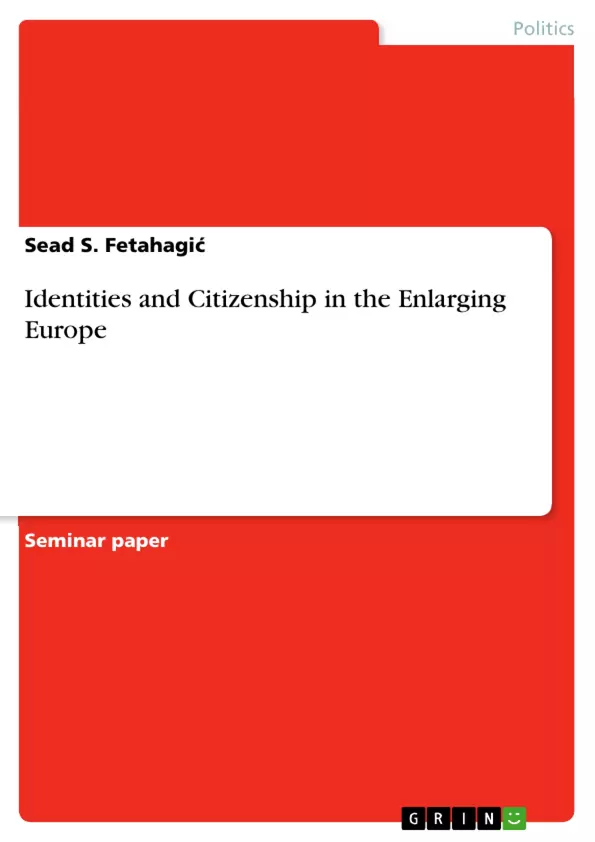In the eve of EU enlargement of 2004 to include eight East-European countries the paper problematized the clash between two historically different concepts of national identity and citizenship. The "culture-nations" of the East are being aligned with the "state-nations" of the West, while the inhabitants of both regions are offered a common perspective to enjoy rights of the EU citizenship. An assumption that newly admitted Eastern countries should somehow adopt the Western "civic" model of nationality is challenged by the fact that even the Western societies are increasingly uncertain about their national and cultural identities under the pressures of economic globalization, producing the phenomenon of "hybrid" or "kaleidoscopic" identities.
Although at this time of enlargement extreme nationalist policies were not dominant, the paper presents the case of the former Yugoslavia whose collapse and ensuing wars showed what consequences might be expected when the concept of national citizenship is reserved exclusively for ethnic majorities. Under the rule of ethnocracy, which operates in the mode of conflict production towards "minorities" or "others", the idea of democratic citizenship is essentially endangered. To deal with this problem some have proposed the idea of "differentiated citizenship" recognizing collective rights of certain groups. Liberal critics however, warn that in such a case citizenship loses its integrative function and endangers the stability of a political community.
The EU citizenship does not replace national citizenship of member states, upon which it is based, but adds a new layer of rights and obligations under the Community Law. Since any citizenship in principle represents a relation between an individual and a political community, the lack of "national" political institutions of the EU generates a "fragmented citizenship". Thereby a EU citizen is frequently in a position, due to proclaimed freedom of movement, to demand rights from a state she is not national of. Even more complex is a problem of third-country (non-EU) nationals legally residing in the Union who are denied Union citizenship. As this citizenship is predicated upon national citizenship, the member states retain sovereign right to impose restrictions on citizenship in order to protect their cultural or political homogeneity.
Inhaltsverzeichnis (Table of Contents)
- THE CONCEPT OF IDENTITIES
- THE CONCEPT OF CITIZENSHIP.
- THE CONCEPT OF CITIZENSHIP OF THE EUROPEAN UNION
Zielsetzung und Themenschwerpunkte (Objectives and Key Themes)
This seminar paper examines the evolving concepts of identity and citizenship within the expanding European Union, particularly in the context of the integration of eight new member states from the former Eastern bloc in 2004. The paper analyzes how the development of a European citizenship may influence traditional cultural, national, and ethnic identities, particularly given the historical differences in these concepts between the East and the West.
- The historical development of "exclusive" and "inclusive" citizenship in the Greek polis and the Roman Empire, respectively.
- The contrasting conceptions of national identity in the West and East, emphasizing the civic nation-state in the West and the culture-nation in the East.
- The impact of globalization and European integration on national and cultural identities, leading to the emergence of "hybrid" identities and a "kaleidoscope of identities".
- The challenges of ethnic identification and nation-state building in post-communist countries, particularly in the Balkans, and the potential for conflict due to the denial of minority rights.
- The concept of ethnocracy and its impact on social relations, institutions, and civic society.
Zusammenfassung der Kapitel (Chapter Summaries)
- THE CONCEPT OF IDENTITIES: This chapter discusses the historical development of the concept of identity, drawing a distinction between the "exclusive" citizenship of the Greek polis and the "inclusive" citizenship of the Roman Empire. It then explores the contrasting conceptions of national identity in the West and East, highlighting the civic nation-state in the West and the culture-nation in the East. The chapter concludes by examining the influence of globalization and European integration on national and cultural identities, emphasizing the emergence of "hybrid" identities and a "kaleidoscope of identities".
- THE CONCEPT OF CITIZENSHIP: This chapter focuses on the concept of citizenship and how it has evolved, particularly in relation to the nation-state. It explores the challenges of defining citizenship in a globalized world, where identities are becoming increasingly complex and fluid. The chapter also discusses the tension between national and European citizenship, and the implications of this tension for the future of the European Union.
Schlüsselwörter (Keywords)
The primary keywords and focus topics of this paper include European Union enlargement, identity, citizenship, national identity, ethnic identity, civic identity, culture-nation, state-nation, globalization, hybrid identities, ethnocracy, post-communist transition, minority rights, and conflict resolution.
- Arbeit zitieren
- Sead S. Fetahagić (Autor:in), 2003, Identities and Citizenship in the Enlarging Europe, München, GRIN Verlag, https://www.grin.com/document/353834



